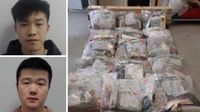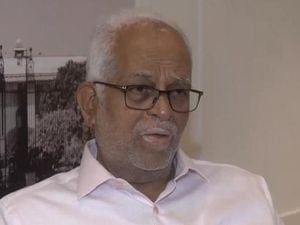Two men from Manchester have been sentenced to prison after orchestrating a sophisticated operation that smuggled cannabis worth an estimated £9 million from England into Northern Ireland, cleverly concealed within hollowed-out pallets of wooden flooring. The case, which unfolded over several years and involved dozens of cross-channel shipments, highlights both the ingenuity and the scale of organized drug trafficking networks targeting the UK and Ireland.
The convicted men, Yudong Ouyang, 32, and Gary Hon, 26, are Chinese nationals who cultivated large cannabis crops in Manchester. According to the National Crime Agency (NCA), the duo exploited the higher street value of cannabis in Northern Ireland, deliberately targeting Belfast as their primary market. As NCA operations manager Barry Vinall explained, "This organised crime group targeted Northern Ireland as their market where they knew their drugs would attract a premium price."
The operation ran from June 2019 to February 2020, during which time Ouyang and Hon used encrypted messaging platforms to coordinate their activities. Investigators later translated messages sent in Mandarin, which revealed discussions about the cannabis trade, warehouse rentals, and travel logistics between Manchester and Belfast. The pair also exchanged tips on evading law enforcement, including one message in which a conspirator wrote, "I put the drug money on me, not in the car, so the sniffing dog could not get the smell."
To move the drugs, Ouyang and Hon would hollow out the inner sections of wooden flooring pallets, creating hidden voids large enough to stash approximately 50 kilograms of cannabis per shipment. These pallets, often weighing up to 1,200 kilograms when declared for shipping—200 kilograms more than their standard weight—were loaded onto Heavy Goods Vehicles (HGVs) and transported by ferry to Northern Ireland. The logistics were handled through legitimate shipping agents, who were unaware of the illicit cargo concealed within the flooring.
According to the NCA and corroborated by multiple reports, the group made up to 38 deliveries from Manchester to Belfast in just nine months. After each delivery, some pallets were shipped back to England, presumably to be reused for further smuggling attempts. This recycling of criminal infrastructure was one of the clever tactics that initially helped the operation avoid detection.
The investigation that ultimately brought the operation down was painstaking. Officers pieced together a mosaic of evidence, including phone records, translated messages, and CCTV footage showing the group in action at various storage units. Ouyang, in particular, left a trail: his fingerprints and an invoice bearing his name were discovered at a cannabis farm raided during the investigation. Phone evidence showed he regularly sent photos of cannabis plants, farms, and even selfies from the illicit sites.
The men’s efforts to cloak their activities as a legitimate business ultimately failed. "They attempted to make their operations appear legitimate but investigators unravelled their vast communications and movements showing they would often transport pallets back across to England so they could be reused for further importations," said Barry Vinall of the NCA. He described Ouyang and Hon as "key players in this large scale cannabis supply operation, producing up to £9 million in profit and working closely with a wider group."
The arrests came in stages. Gary Hon was apprehended by NCA officers in February 2022, while Yudong Ouyang managed to evade capture until December 2023. Their legal reckoning followed swiftly: Ouyang pleaded guilty to conspiracy to supply class B drugs in January 2024, and Hon entered the same plea on June 25, 2025. Both appeared at Manchester Crown Court, where, on August 18, 2025, they were sentenced—Hon to three years and one month, and Ouyang to three years and six months in prison.
The case also had wider ramifications. Two other men, Luis Ieong and Ming Liang He, were convicted in Northern Ireland after being caught in January 2020 transporting nearly 11 kilograms of cannabis in a vehicle. CCTV footage placed them at a Belfast storage unit housing boxes of flooring with internal cavities similar to those used by Ouyang and Hon. A subsequent search uncovered a further 35.5 kilograms of cannabis and £70,000 in cash. Both men received 13-month prison sentences in December 2020.
The scale of the smuggling operation is striking: over the nine-month period, the group is believed to have trafficked nearly two metric tonnes of cannabis, all hidden in flooring that would pass as ordinary building supplies to the untrained eye. The use of legitimate shipping agents, who had no knowledge of the criminal activity, added a further layer of complexity, making detection all the more difficult for authorities.
Investigators were able to link the men to the operation not only through digital and physical evidence but also via contact details on invoices from legitimate storage businesses, which traced back to both Ouyang and Hon. The NCA emphasized that taking down such operations is a priority, not only because of the drugs themselves but also due to the broader criminal networks they support. As Vinall noted, "Gangs like those run by Ouyang and Hon fuel an industry that sees people transported to the UK to work illegally in cannabis farms and taking action against those involved in these crimes is a priority for the NCA."
This case shines a light on the evolving tactics of organized crime in the UK and Ireland. The criminals’ willingness to innovate—using hollowed-out flooring, encrypted communications, and legitimate shipping channels—demonstrates both the scale of the challenge facing law enforcement and the importance of international cooperation. The NCA’s success in unraveling the scheme relied on a combination of traditional detective work and modern digital forensics, as well as collaboration with local police and customs officials.
For the people of Northern Ireland and Manchester, the case is a reminder of the persistent threat posed by drug trafficking networks and the lengths to which they will go to exploit markets and evade detection. While Ouyang and Hon’s operation has been dismantled, authorities remain vigilant, knowing that similar schemes may be in the works elsewhere. For now, the hope is that these convictions send a clear message: even the most elaborate criminal enterprises can—and will—be brought to justice.





